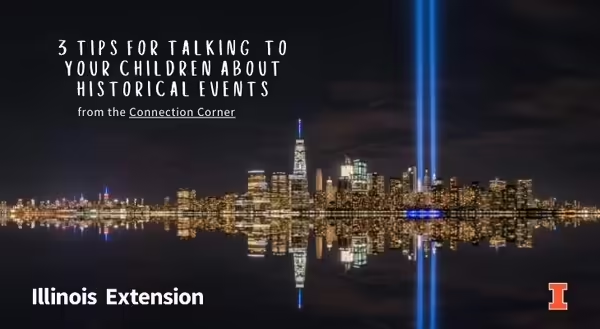
As we approach the anniversary of 9/11, now known as Patriot Day, it is important to take a moment to remember the significance of that day – the lives lost, the heroes of that day, and the emotional impact it had on the people and the country. It is also important to note that as time passes, many adults remember where they were on that day, however young people, especially young children today see it as a point in history-something that happened before they were alive.
As you prepare to talk with children about 9/11 and other significant events in history, here are some tips to help you navigate the conversation:
Keep the conversation age appropriate
For younger children, it is best to ask what they have heard first, because they are often too young to understand the gravity of the events, so learning what they know first is crucial. As children get older, talking about it with brief, simple facts is a good first step. From there, you can determine how much to share based on their interest, maturity, and comprehension of what you have discussed.
Educate yourself
Regardless of what piece of history you are talking about, it is important to make sure you understand the event in history and your perspective regarding that event. The more time has passed since a historical event, the easier it is for facts to become blurry and you don’t want to give misinformation. If you are unsure of how to explain what happened, there many resources online that can help you find the words or share the story in a way that meets your children’s needs. Helping Your Child Learn History is a resource from the U. S. Department of Education that provides a lot of ideas on how to encourage discussions about history.
Be honest about your feelings
Specifically for 9/11, if you remember where you were, how you were feeling, and how you dealt with those emotions, it is important to share that with your children. Understanding how adults deal with strong emotions and traumatic events can help children navigate their own emotions and give them a sense that there are ways to work through the emotions and move forward.
Encouraging historical discussions is important and there are so many resources available now, from books at your library, podcasts and videos, to online quizzes and trivia games. Learning about history, even the tragic events, can encourage a passion history and sharing it with others.
MEET THE AUTHOR
Judy Schmidt provides leadership to 4-H metro programming in Peoria County. Schmidt joined Extension in 2001, working as a Youth Development Educator at the East Peoria Center and joined the Fulton-Mason-Peoria-Tazewell unit in 2011. Her work focuses on 4-H youth development programming in the local metropolitan area, specifically leading positive youth development initiatives for after-school programs, community groups, 4-H clubs and other youth-serving organizations. Her areas of expertise include positive youth development principles, youth leadership, and work with teens as teachers.
Schmidt attended the University of Illinois at Urbana-Champaign for her bachelor's degree in psychology and also for her master's degrees in Social Work and Marriage and Family Therapy. She is a certified facilitator of the Matrixx System/Real Colors program by the National Curriculum and Training Institute.
ABOUT THE BLOG
Connection Corner: is a blog that provides timely information, activities, and resources to help you stay connected to loved ones, the world around you, and yourself.